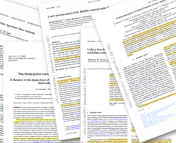Note: the author of this article is not a member of Astro Grads United.
Over the past few years, graduate students in Astronomy across the US have been discussing the struggles of being a graduate student. One graduate student in particular noticed recurring themes in these conversations. For instance, many graduate students felt their salaries were not reflective of the cost of living, and their universities were not responsive when they requested a raise. For others, housing was a constant source of stress when universities failed to offer guaranteed housing for grad students. Others also worried about toxic advisors. As a result of these conversations, Astro Grads United was formed, which one member describes as “a space for grad students to move through and vent/share/co-strategize.”
At the moment, Astro Grads United is not an official organization, but rather a group of students who support each other online and meet virtually. The motivation behind Astro Grads United is for students to share their experiences – both good and bad, as well as strategize, build community, and offer support. For instance, students at University of Florida (UF) were surprised to learn that Princeton offers guaranteed housing to their grad students, while students at Princeton shared their frustrations at not having a union, something that UF has already established.
Given the recurring conversations, Astro Grads United became a vehicle for grad students to share their concerns. At their first quarterly meeting, students from ~10 schools (in Physics and/or Astronomy) discussed their salaries and cost of living to benchmark themselves against other departments. The table below summarizes the fraction of a students’ salary that goes towards their rent (normalized to one bedroom) for a handful of Astronomy departments.
| School | Average Annual Salary (2021-2022) |
Average Percentage of Salary Paid Towards Rent |
| University of Florida | 25k | 60% |
| UC Berkeley | 34k | 60% |
| Johns Hopkins University | – | 40-50% |
| UC Irvine | 27k | 35-40% |
| Princeton | 47k | 50% |
| Purdue | 21k | 25% |
In 2020, grad students at UC schools gathered similar information on the cost of living. Their findings, referred to as the “Cost of Living Adjustment (COLA)” white paper, can be found here. Note that this effort was independent of Astro Grads United.
It’s no secret that grad students’ salaries are not always sufficient. Recently, astronomy students at Purdue University received a raise after 11 years, only after a former grad student returned to the department as a professor and noticed that students were getting paid the same amount as they had been during their PhD.
Last year, students at Johns Hopkins University (JHU) made a convincing argument to the institution for a raise; however, the dean rejected the request arguing that the university did not have the money. Students appealed the rejection which was further ignored. This decision by the dean came after the Department of Physics & Astronomy received a private donation of 75 million dollars. Thankfully, grad students in the astronomy department at JHU received a raise of $667 after five years.
Another common issue facing grad students is the lack of affordable and guaranteed housing. For instance, not only does the University of Florida not provide guaranteed graduate housing, but they’re also demolishing one of the few complexes that provide housing for grad students and families. While UF ‘helps graduate students find housing both on and off campus‘, there is a lack of sufficient options, forcing the university to use a lottery system for students that enroll. Johns Hopkins University is also another institution that doesn’t offer guaranteed student housing. While looking for off-campus housing is an option, students note there has been a 50% increase in the average cost of housing within walking distance of the department in the last few years, making off-campus housing an unfavourable option.
While students can reach out to their advisors for financial advice and support, a goal of Astro Grads United is to get away from having to rely on an advisor being a good faith actor. For instance, it was only thanks to the persistence of a returning student that grad students at Purdue University received a raise. Similarly at Penn State, a faculty member helped to implement a policy so that research assistants and teaching assistants were taxed less. However, there have been instances in which advisors who have tried to help their students were chastised by their university. In addition, many departments have organizational problems where the students end up suffering. For instance, international students at JHU did not get paid for months due to logistical issues.
It’s normal to find an entity to blame, but it seems these issues are present in many departments across the country. A possible solution is to have a central organization like the American Astronomical Society (AAS) be responsible for assessing the stipend, cost of living, and collecting other relevant information, while offering solutions to astronomy departments across the country. Although AAS is now performing site visits to assess quality of programs, it seems students’ salary and housing are not yet a priority.
While only a few, there are examples of departments acknowledging their students’ concerns, and implementing changes. For instance, grad students at Penn State were relieved when a code of conduct was adopted by the department for the first time, and students were finally invited to serve on the admissions committee.
For potential allies out there, such as postdocs or faculty members, members of AGU ask that you talk to grad students in your department and amplify their voices. If students in your department have a problem, then Astro Grads United directs them to the links at the end of this article where they can share their grievances, request access to a Discord server and attend quarterly Zoom meetings.
Barriers like inadequate salary and unaffordable housing discourage students from staying in academia. Toxic advisors, and a lack of consequences for these advisors, also make it difficult for students to continue to follow their love for astronomy. Although Astro Grads United allows students to share injustices in their departments, there is still a need for an overarching organization that holds departments accountable and protects students. Most universities do not have a graduate student union (eg. Princeton), and not all departments have generous advisors that can help to implement change (eg. Penn State). Until students feel safe throughout their PhD, organizations like Astro Grad United become a place for students to find community and support.
To request access to the Discord server and/or to share your experiences, grievances and struggles anonymously: https://docs.google.com/forms/d/e/1FAIpQLScahQAvzxGk7jxzteNs3Q3cTgqAUMtf6uWTI2H-XUQd26rxfA/viewform
Astro Grads United is also collecting information on students’ stipends and cost of living; to provide data anonymously, please use this form: https://docs.google.com/forms/d/e/1FAIpQLScmLaz3thzNVGhOSVre3zIdQ93-E0dOzX45mA3ZJnWw1pyBqw/viewform
Disclaimer: The personal views and opinions expressed in this article are not necessarily representative of the views of the American Astronomical Society or other institutions with whom Astrobites authors are affiliated. The details provided in this article are shared anonymously, and I certify that they are true to the best of my knowledge. I want to ensure that although only a few institutions were named in this article, there are countless other institutions who treat their graduate students unfairly. The universities mentioned in this article were not unfairly chosen, while universities not mentioned were not given an unfair advantage.
Edited by: Graham Doskoch, Pratik Gandhi
Featured image credit: Beth LaBerge/KQED




